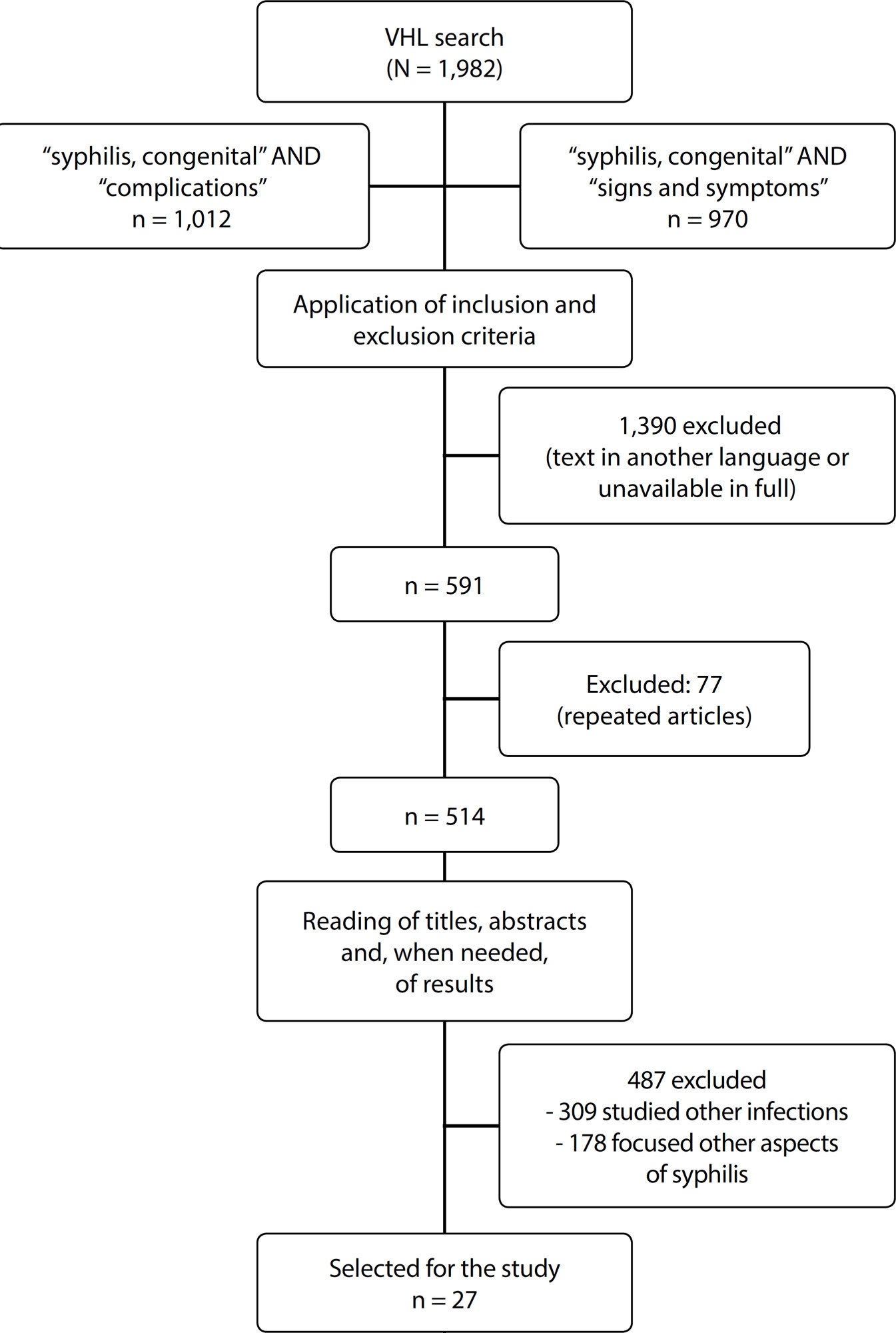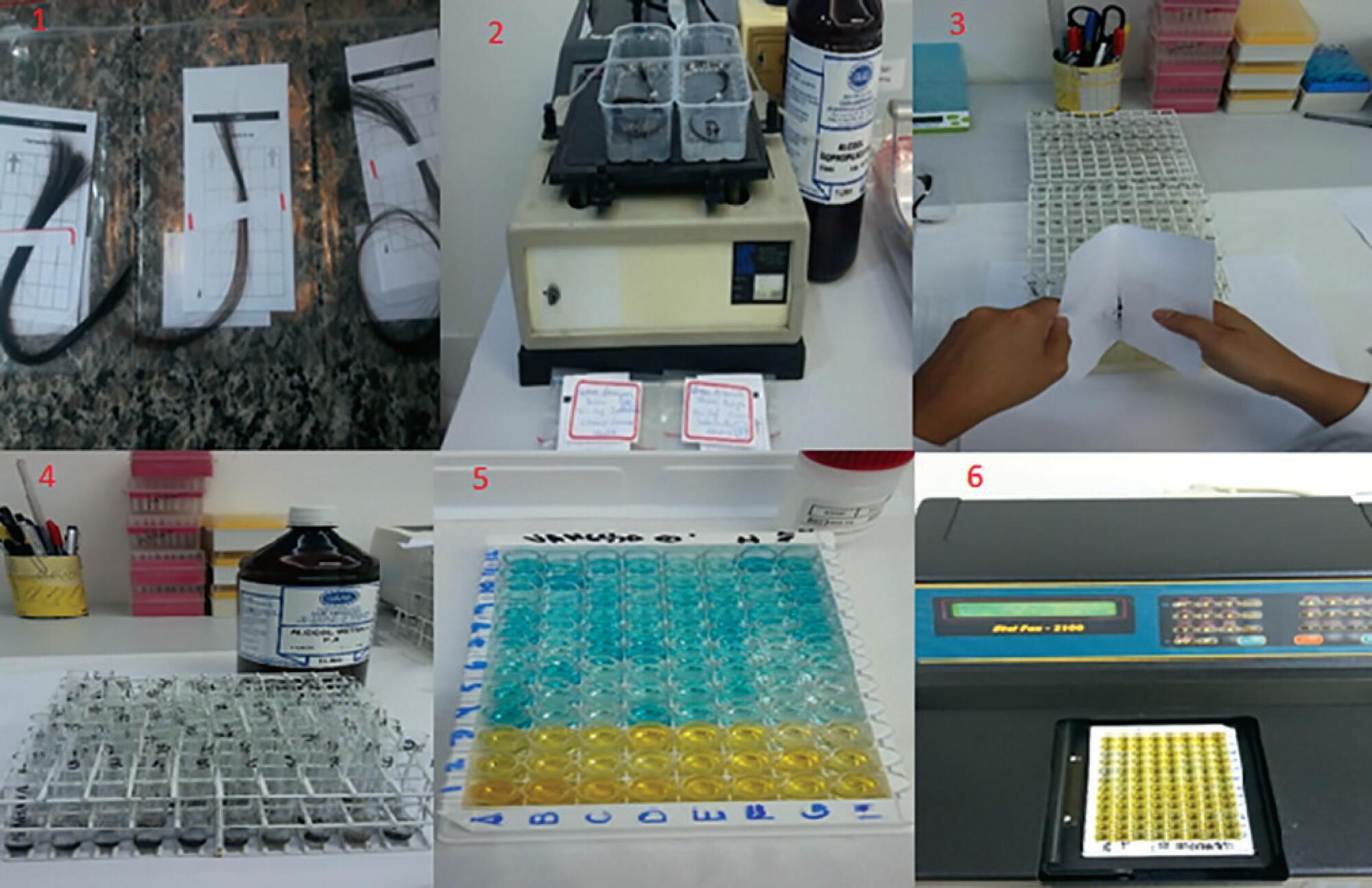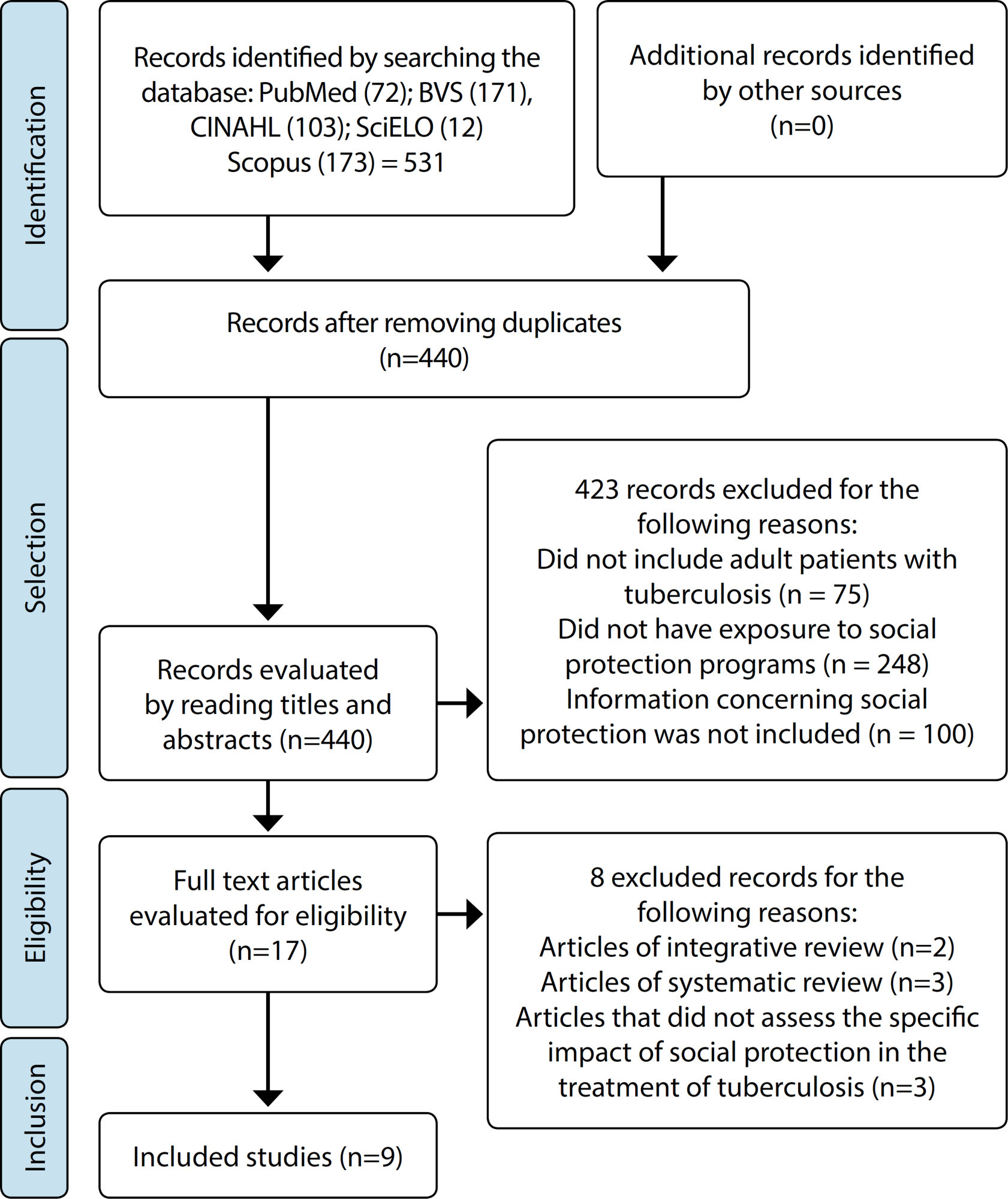-
RESEARCH01-01-2017
Validation of an instrument regarding nursing intervention in patients in vasoactive therapy
Revista Brasileira de Enfermagem. 2017;70(3):453-460
Abstract
RESEARCHValidation of an instrument regarding nursing intervention in patients in vasoactive therapy
Revista Brasileira de Enfermagem. 2017;70(3):453-460
DOI 10.1590/0034-7167-2016-0254
Views0See moreABSTRACT
Objective:
to validate the content of a Standard Operational Procedure, regarding nursing interventions in emergency patients treated with vasoactive drugs.
Method:
methodological study, carried out from December 2015 to January 2016. Content validity was determined by 16 experts (13 nurses, 2 pharmacists and one biomedical scientist), who judged it through a four-point Likert scale. The items were evaluated in terms of: feasibility, objectivity, simplicity, clearness, pertinence and accuracy. The Content Validity Index was applied, accepting the value ≥ 0.90.
Results:
two rounds of evaluation were required to achieve the minimum index. The items were reviewed regarding writing, dilution, indication and replacement interval. The instrument was validated with 33 items and with total Content Validity Index of 0.99.
Conclusion:
the instrument was considered appropriate, fractionally and globally, for nursing care for the patient treated with vasoactive drugs in emergency, in a safe and reliable way.
-
01-01-2017
Nursing in cardiology: state of the art and frontiers of knowledge
Revista Brasileira de Enfermagem. 2017;70(3):451-452
Abstract
Nursing in cardiology: state of the art and frontiers of knowledge
Revista Brasileira de Enfermagem. 2017;70(3):451-452
DOI 10.1590/0034-7167.2017700301
Views0Heart diseases lead the group of clinical disorders with higher rates of hospitalization and mortality and present a progressive increase in incidence due to population ageing, simultaneously to the development of new health therapies and technology. DATASUS() estimated a cost of nearly 700 million Reais for the country’s health care system in 2015, only for […]See more -
01-01-2017
Enfermagem em cardiologia: estado da arte e fronteiras do conhecimento
Revista Brasileira de Enfermagem. 2017;70(3):451-452
Abstract
Enfermagem em cardiologia: estado da arte e fronteiras do conhecimento
Revista Brasileira de Enfermagem. 2017;70(3):451-452
DOI 10.1590/0034-7167.2017700301
Views0As doenças cardíacas lideram o grupo das desordens clínicas de maiores taxas de hospitalização e mortalidade, além de apresentarem um progressivo aumento da incidência na população devido ao envelhecimento concomitante ao desenvolvimento das terapias e tecnologias em saúde. Uma estimativa obtida pelo DATASUS() acusa um gasto onerado ao sistema de saúde do país, no ano […]See more -
REFLECTION01-01-2017
Nursing care in early childhood: contributions from intersubjective recognition
Revista Brasileira de Enfermagem. 2017;70(2):446-450
Abstract
REFLECTIONNursing care in early childhood: contributions from intersubjective recognition
Revista Brasileira de Enfermagem. 2017;70(2):446-450
DOI 10.1590/0034-7167-2016-0319
Views0See moreABSTRACT
Objective:
to understand the elements composing intersubjective recognition that are relevant for nursing care in early childhood in favor of comprehensive child development.
Method:
reflexive study based on the Honnethian concept of intersubjective recognition in the dimensions of affection, defense of rights, and social esteem.
Results:
nursing knowledge and practices, permeated by the intersubjective recognition in the mentioned dimensions, contribute to the dynamism of interpersonal relations, the production of co-responsibility, and shared construction of health care in early childhood, with benefits to comprehensive development.
Conclusion:
a successful coordination of the three intersubjective dimensions enables the expansion of the understanding on childhood and nursing care in child health in the field of human development promotion, covering affection, defense of rights, and social esteem in the established relationships with future positive individual and social possibilities.
-
REFLECTION01-01-2017
Hand hygiene as a caring practice: a reflection on professional responsibility
Revista Brasileira de Enfermagem. 2017;70(2):442-445
Abstract
REFLECTIONHand hygiene as a caring practice: a reflection on professional responsibility
Revista Brasileira de Enfermagem. 2017;70(2):442-445
DOI 10.1590/0034-7167-2016-0189
Views0See moreABSTRACT
Hand hygiene represents a fundamental nursing care practice and is traditionally considered the most important and effective measure in the prevention and control of healthcare-related infections. However, studies indicate that adherence to the procedure is unsatisfactory throughout the world, and show low adherence rates. In a context in which patient safety stands out as a priority, this text submits refl ections about professional responsibility when not adhering to hand hygiene practices, and ethical aspects related to this conduct.
-
REFLECTION01-01-2017
Systematization of nursing care and the formation of professional identity
Revista Brasileira de Enfermagem. 2017;70(2):436-441
Abstract
REFLECTIONSystematization of nursing care and the formation of professional identity
Revista Brasileira de Enfermagem. 2017;70(2):436-441
DOI 10.1590/0034-7167-2016-0515
Views0See moreABSTRACT
The aim of this study is to explore arguments that broaden the understanding of possible links between the organization of nursing care and the structuring of professional identity. For that purpose, some aspects related to these themes are addressed, highlighting issues regarding differences in the concepts of the organization of nursing care and the nursing process, as well as the performance of this activity and its possible impact on the establishment of its relationship with the professional identity. Emphasis is given to the need to stimulate the debate on the subject by nursing professionals involved in the training of human resources and the provision of care, as well as in class entities, in order to deepen understanding of these concepts as significant elements for strengthening our professional identity.
-
REFLECTION01-01-2017
Brazilian method for the development terminological subsets of ICNP®: limits and potentialities
Revista Brasileira de Enfermagem. 2017;70(2):430-435
Abstract
REFLECTIONBrazilian method for the development terminological subsets of ICNP®: limits and potentialities
Revista Brasileira de Enfermagem. 2017;70(2):430-435
DOI 10.1590/0034-7167-2016-0308
Views1See moreABSTRACT
Reflection on the limits and potentialities of a Brazilian method for the development of terminological subsets of ICNP®,(International Classification for Nursing Practice) based on the correlation between this method and international methods. This issue has been debated by the International Council of Nurses (ICN). Although the council propose a guideline for elaboration, they encourage and reinforce the use of various perspectives and processes in the development of subsets. Brazilian Nursing needs to propose a method and deepen reflections on the use of terminological subsets of ICNP® in the reality of the country. The development of subsets in Brazil is considered incipient and the proposed method needs to be used and deepened in order to spread the use of terminology through the application of subsets.
-
EXPERIENCE REPORT01-01-2017
Focus group on qualitative research: experience report
Revista Brasileira de Enfermagem. 2017;70(2):424-429
Abstract
EXPERIENCE REPORTFocus group on qualitative research: experience report
Revista Brasileira de Enfermagem. 2017;70(2):424-429
DOI 10.1590/0034-7167-2016-0091
Views1See moreABSTRACT
Objective:
to report the experience of applying the focus group technique for production of data in qualitative research.
Method:
four group sessions were held from May to June 2015, with the participation of professionals from the public sector of PHC and from specialized service.
Results:
the way focus group was developed is described in steps: planning, recruitment, ambience, group sessions, and evaluation.
Conclusion:
we highlight that the focus group, as a technique to produce data in collective space, can contribute not only to the construction of knowledge in Nursing, but also to the research approach with the assistance practice.

-
REVIEW07-14-2021
Complications, clinical manifestations of congenital syphilis, and aspects related to its prevention: an integrative review
Revista Brasileira de Enfermagem. 2021;74(4):e20190318
Abstract
REVIEWComplications, clinical manifestations of congenital syphilis, and aspects related to its prevention: an integrative review
Revista Brasileira de Enfermagem. 2021;74(4):e20190318
DOI 10.1590/0034-7167-2019-0318
Views0See moreABSTRACT
Objectives:
to identify the scientific evidence about the clinical complications and manifestations of congenital syphilis and aspects related to its prevention.
Methods:
integrative review after a search in the databases LILACS and MEDLINE, carried out in March 2018, using the descriptors “syphilis, congenital”, “complications”, and “signs and symptoms”, leading to the selection of 27 researches.
Results:
the publications found were published from 1966 to 2017, and most of them were from Latin America and Africa. Negative outcomes, laboratory changes, and the clinical manifestations in congenital syphilis, whether early or delayed, were, respectively: low weight at birth, anemia, hepatosplenomegaly, and dental alterations. The lack of treatment of the pregnant women in the prenatal was the most common occasion in which the opportunity to prevent the complications of congenital syphilis was lost.
Conclusions:
the scientific evidences analyzed showed serious complications of congenital syphilis that could be avoided if early opportunities of diagnosing and treating the pregnant women are not lost during the prenatal.

-
ORIGINAL ARTICLE07-15-2020
Cultural adaptation of Infant Feeding Intentions Scale (IFI) for pregnant women in Brazil
Revista Brasileira de Enfermagem. 2020;73:e20190103
Abstract
ORIGINAL ARTICLECultural adaptation of Infant Feeding Intentions Scale (IFI) for pregnant women in Brazil
Revista Brasileira de Enfermagem. 2020;73:e20190103
DOI 10.1590/0034-7167-2019-0103
Views0See moreABSTRACT
Objectives:
to translate and culturally adapt the Infant Feeding Intentions Scale for pregnant women in Brazil.
Methods:
methodological study that included stages of translation, synthesis, face and content validation, back translation and semantic assessment. In the face and content and semantic validation stages, we used the Content Validity Index for individual items and for the overall scale for clarity and representativeness.
Results:
nine (100.0%) experts participated in face and content validation, and the average index obtained was 85.0% for representativeness. In the semantic assessment, performed with 31 (100.0%) pregnant women, the tool was considered clear, obtaining an average index of 91.0%.
Conclusions:
the Brazilian version of the scale was considered representative and clear. After assessing psychometric properties, the scale is expected to be valid and reliable to assess maternal intention to breastfeed exclusively until the infant’s six months of life in different Brazilian settings.
-
ORIGINAL ARTICLE03-24-2021
Development, validation and application of clinical simulation scenarios for assessment of stomatherapy specialists
Revista Brasileira de Enfermagem. 2021;74(1):e20200360
Abstract
ORIGINAL ARTICLEDevelopment, validation and application of clinical simulation scenarios for assessment of stomatherapy specialists
Revista Brasileira de Enfermagem. 2021;74(1):e20200360
DOI 10.1590/0034-7167-2020-0360
Views0See moreABSTRACT
Objectives:
to build and validate three clinical simulation scenarios and report the application with candidates for the specialist’s degree in stomatherapy.
Methods:
methodological study, building three scenarios and evaluation checklists; content validation with judges, using content validity index and Modified Kappa Coefficient; pre-test and application.
Results:
scenarios built based on nursing care for: 1. insufficiency and venous ulcer; 2. demarcation of intestinal stomia; and 3. Clean intermittent catheterization. In the content validation of the 24 items appreciated, 83%, 80%, and 92% were validated without change. In the pre-test, the objectives and checklists were adjusted. In the application, to standardize the evaluation, actors and evaluators were trained previously, and each candidate passed the three stations.
Conclusions:
scenarios built and with validated content, based on evidence and covering the three areas of stomatherapy. The pre-test allowed for adjustments in the scenarios, and the candidates achieved the expected objectives.
-
ORIGINAL ARTICLE12-07-2020
Management of home care by family caregivers to elderly after hospital discharge
Revista Brasileira de Enfermagem. 2020;73:e20200474
Abstract
ORIGINAL ARTICLEManagement of home care by family caregivers to elderly after hospital discharge
Revista Brasileira de Enfermagem. 2020;73:e20200474
DOI 10.1590/0034-7167-2020-0474
Views1See moreABSTRACT
Objective:
To understand the management of home care by family caregivers of dependent elderly people after hospital discharge.
Methods:
Qualitative research guided by hermeneutics-dialectic, anchored in the theory of communicative action. Data collection took place using a semi-structured interview with 11 participants.
Results:
Two categories were constructed: Management of the many types of care by the caregiver and the relationship between family caregiver and health care network. Care and management actions carried out routinely cause major changes in the family caregiver’s life. He/she does not recognize planning, home care periodicity or support in required procedures.
Final Considerations:
The management of home care for dependent elderly people after hospital discharge is complex, involving physical and emotional overloads, as well as difficulties in getting support from health services. The planning shared between the health team and the family since the discharge is required, and the better visibility of the role of primary care when the patient is assisted by a home care service.
-
07-09-2021
Sexuality is associated with the quality of life of the elderly!
Revista Brasileira de Enfermagem. 2021;74:e20201272
Abstract
Sexuality is associated with the quality of life of the elderly!
Revista Brasileira de Enfermagem. 2021;74:e20201272
DOI 10.1590/0034-7167-2020-1272
Views0See moreABSTRACT
Objective:
to analyze the association between sexuality and quality of life of Brazilian elderly residents in the community.
Methods:
a cross-sectional study conducted with 477 Brazilian elderly. The data were collected between August and October 2020. We used the EVASI and WHOQOL-OLD (World Health Organization Quality of Life). Data analysis was performed with Mann-Whitney, Spearman and Kruskal-Wallis correlation tests, with Bonferroni post-hoc application when necessary, considering a 95% confidence interval.
Results:
there was a statistical association between all dimensions of sexuality and the general quality of life of the elderly (p<0.05).
Conclusion:
the stimulation of sexuality can be configured as an innovative and holistic strategy focused on the promotion of health and active aging, since this study found the association between sexuality and the general quality of life of elderly people.
-
ORIGINAL ARTICLE06-01-2020
Stress and cortisol levels among members of the nursing team
Revista Brasileira de Enfermagem. 2020;73:e20180953
Abstract
ORIGINAL ARTICLEStress and cortisol levels among members of the nursing team
Revista Brasileira de Enfermagem. 2020;73:e20180953
DOI 10.1590/0034-7167-2018-0953
Views0See moreABSTRACT
Objective:
To analyze the characteristics of hospital nursing professionals with the presence of stress, and to associate this with capillary cortisol.
Method:
A cross-sectional, exploratory and correlational study, conducted in a hospital in São Paulo, Brazil. A total of 164 nursing professionals participated; the Perceived Stress Scale was administered, and hair samples were obtained for laboratory analysis. Data were entered into a Microsoft Excel spreadsheet (2010), and then into Microsoft Office and the R software, version 3.2.2.
Results:
High levels of capillary cortisol in 47% of participants suggest the presence of stress, but no statistical significance between cortisol and stress levels were found.
Conclusions:
Stress and capillary cortisol levels were indicative of stress among nursing professionals; however, no association between them was found, although the values found were above those recommended.

-
REVIEW06-18-2021
Impact of social protection programs on adults diagnosed with Tuberculosis: systematic review
Revista Brasileira de Enfermagem. 2021;74(3):e20190906
Abstract
REVIEWImpact of social protection programs on adults diagnosed with Tuberculosis: systematic review
Revista Brasileira de Enfermagem. 2021;74(3):e20190906
DOI 10.1590/0034-7167-2019-0906
Views0See moreABSTRACT
Objectives:
to analyze the impact of social protection programs on adults diagnosed with Tuberculosis.
Methods:
systematic review conducted by PRISMA, with registration PROSPERO CRD42019130884. The studies were identified in the VHL, PubMed, Scielo, CINAHL and Scopus databases, using the descriptors “Social Protection” and “Tuberculosis”, in combination with keywords combined with Boolean operators AND and OR. Observational and interventional studies published until October 23, 2019, in Portuguese, English and Spanish, were included.
Results:
social protection programs improve the treatment of tuberculosis, cure rates, adherence to treatment, the provision of services for the control of TB and reduce poverty.
Conclusions:
social protection programs have a positive impact on the treatment and control of people diagnosed with Tuberculosis.

-
ORIGINAL ARTICLE12-05-2019
Functional health literacy in hypertensive elders at primary health care
Revista Brasileira de Enfermagem. 2019;72:266-273
Abstract
ORIGINAL ARTICLEFunctional health literacy in hypertensive elders at primary health care
Revista Brasileira de Enfermagem. 2019;72:266-273
DOI 10.1590/0034-7167-2018-0897
Views0See moreABSTRACT
Objective:
to assess the relationship between inadequate functional health literacy and inadequate blood pressure control in older people with hypertension in Primary Health Care.
Method:
a cross-sectional study with sample calculated at 392. SAHLPA-18 tool was used for functional health literacy; blood pressure was measured; sociodemographic and clinical data were collected. Hierarchical logistic regression was used.
Results:
(high) inadequate blood pressure and (low) functional inadequate health literacy were present in 41.6% and 54.6% of the people, respectively. Factors associated with inadequate blood pressure were: inadequate functional health literacy, black-brown skin color, overweight-obesity, hypertension diagnosis time, non-adherence to exercise/diet, drug treatment. Schooling had no association with inadequate blood pressure
Conclusion:
hypertensive elderly people with inadequate health literacy were more likely to have inadequate blood pressure. Thus, health professionals need to value functional health literacy as a possible component to control blood pressure.
Search
Search in:
Nuvem de Tags
Adolescente (85) Atenção Primária à Saúde (239) COVID-19 (91) Criança (91) Cuidados de Enfermagem (269) Educação em Enfermagem (151) Educação em Saúde (139) Enfermagem (930) Enfermagem Pediátrica (86) Estudantes de Enfermagem (77) Estudos de Validação (131) Família (87) Idoso (208) Promoção da Saúde (99) Qualidade de Vida (104) Saúde do Trabalhador (86) Saúde Mental (145) Saúde Pública (82) Segurança do Paciente (150) Tecnologia Educacional (100)



